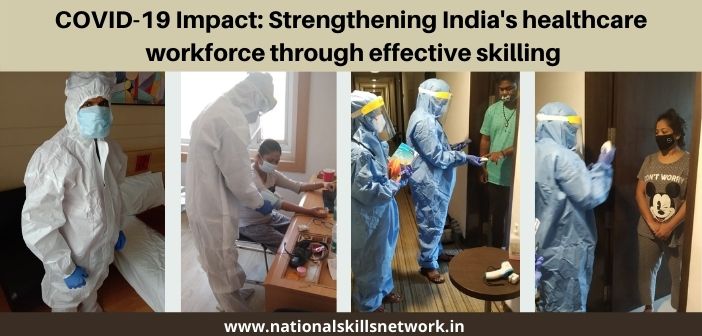
“One of the biggest challenges the pandemic has highlighted is the lack of skilled professionals in healthcare, apart from the shortage of oxygen and lack of basic resources”, says Dr. Srinivasa Rao Pulijala, CEO, Apollo Medskills.
India is currently faced with the world’s largest surge in COVID-19 cases. With oxygen shortage, lack of a sufficient number of beds for the patients, increasing demand for sample collection, at-home medical services, the steady rise in cases are straining the already stressed healthcare infrastructure in the country.
The ongoing Coronavirus pandemic has highlighted the shortage of skilled people in the healthcare industry. This is a challenge as well as an opportunity to bring and train the workforce to fulfill the need for skilled resources in the healthcare sector.
We conversed with Dr. Srinivasa Rao Pulijala, CEO, Apollo Medskills to know how the organization is bridging the skill gap in the healthcare sector, online skill-based training, in-demand job roles, skill requirement, among others.
These are few excerpts from our conversation. You can watch the full video interview on our YouTube channel, for which the link is given below.
Q: What is the impact of the second wave of COVID-19 on the healthcare industry in terms of skilled healthcare professionals?
A: Currently, there is a huge skill gap in the healthcare industry. One of the biggest challenges the pandemic has highlighted is the lack of skilled resources like doctors, nurses, allied health professionals, support workers across the spectrum of healthcare, apart from the shortage of oxygen and lack of basic resources.
As per the National Health Profile 2018, India is spending less than 1% of GDP (Gross Domestic Product) on public health. Despite being the largest supplier of healthcare human resources to the world, there is a shortage of close to 10 lakh doctors, 20 lakh nurses, and 40 lakh allied workers and support staff across India.
Shortage of manpower in healthcare is a challenge not only in India but across the globe. This requires scaling up of the healthcare skilling and healthcare education as a whole.
Q: How is Apollo Medskills addressing the challenge of capacity building in the healthcare sector?
A: We have realized there is a huge demand for some job roles at various levels. Some of them are:
-
Phlebotomy Technicians
-
Medical Lab Technicians
-
Home Healthcare Aides and Geriatric Aides
-
Telehealth Coordinators
-
Pharmacy Technicians and Assistants
When there comes a challenge of addressing these needs, we train students through various schemes under the Ministry of Rural Development, Ministry of Skill Development and Entrepreneurship, NSDC, State Corporations, etc. So far, we have trained close to 68,000 people.
The alumni were also trained on an upskilling programme for COVID-19 management as they have shown interest to serve as frontline workers.
Some of the immediate demand areas for healthcare professionals are:
- Hospitals: Nurse Assistants are in-demand at hospitals. We have trained General Duty Assistants for COVID-19, on how to use oxygen cylinders, oxygen concentrators, what precautions to be taken, and various other emergency needs. It is a 60-hour training programme on some key skills required to tackle the COVID-19 pandemic.
- Isolation Rooms: We trained healthcare resource persons on monitoring vitals, sanitization of rooms and beds, etc., and how to monitor the patients in isolation rooms.
- Healthcare Support Call Centers: Hospitals receive around 15,000 to 20,000 calls each day across India. Therefore, the people are trained in our 50-hour Healthcare Support Centre Executive programme to attend those calls and assist them.
- Vaccination Centres: We are training resources to be vaccine coordinators for rural India. India has taken up mass vaccination drives in urban areas but the citizens in rural India are finding it difficult to book a slot. So, the Vaccination Coordinators help the citizens of rural India in getting the vaccination slot, to observe the patients after vaccination, etc.
We trained the Vaccination Coordinators in the following aspects:
- Administrative aspects of vaccination drives
- How to load vaccine and assist a nurse
- Post-vaccine observation
Apart from these, we trained our doctors on using ventilators and handling disasters. About 25,000 students have registered for our e-learning programmes.

Q: Are there any initiatives to support and manage the mental health of healthcare workers?
A: Mental health is as challenging as physical health. Not only to the general population, but mental health is also hitting healthcare workers as well. In concern to this, we set up a support center where a psychiatrist assists the healthcare workers. We also came up with an initiative called ‘Thank a Nurse’ to improve their mental health and boost their morale.
People are predominantly suffering from depression due to fear, panic, and negative information, which is further leading to psychosis.
We deal with all of this in a very careful manner over a call center. We have a dedicated call center to address mental health for both healthcare workers and the general population.
Q: What are some of the top job roles in healthcare that youth can consider joining?
There is pride in serving the nation. Choosing a career in healthcare can be a great decision. Healthcare is driven by multiple other roles and not just clinical. As there is a huge shortage of medical resources, the demand for healthcare professionals is high.
We can classify the job roles into immediate-need and mid-to-long-term needs.
The immediate need is for Phlebotomy Technicians, Medical Lab Technicians, Home Health Aides, Telemedicine Assistants, and Pharmacy Technicians. These job roles are in intense demand.
For these immediate needs, we need resource people for COVID-19 vaccination centers, because for every vaccination center, we require about 11 people.
This includes four kinds of resources –
- Inoculator – They are Vaccinators. The Ministry of Health and Family Welfare has published an SOP for vaccination drives. This SOP has defined about four or five healthcare roles to be vaccinators like the doctors, nurses, AYUSH workers, pharmacists, medical and nursing students.
- Vaccination Officers – Administrative officers who register patients on the COWIN portal, verify their Aadhar cards, verify age details, etc.
- Crowd management – Vaccination drives call for large gatherings, therefore the government has engaged police, CRPF, and the Indian army to manage the crowd near the vaccination centers.
- Post Vaccine Observers – These are the people who observe and monitor the public for any adverse reaction after the vaccination.
Also read: Skill2Jobs – Healthcare Industry: Skills, Training, and Careers – https://nationalskillsnetwork.in/skill2jobs-healthcare-industry-skills-training-and-careers/
As per the Government of India’s estimation, we require around two lakh new Inoculators and three to four lakh additional healthcare support workers to manage these vaccination drives.
There is a high demand for Emergency Medical Technicians who manage acute emergencies at home and transport patients safely to the hospitals. They also work in the critical care units of COVID-19 wards.
Along with the Healthcare Call Center Executives, we are training even the non-healthcare executives by giving FAQs to assist the immediate needs based on the guidelines issued by the Ministry of Health and Family Welfare.
We need more Medical Lab Technicians, Home Healthcare Workers, Phlebotomists, Emergency Medical Technicians, General Duty Assistants in the long term.
Q: How do you see the future of the healthcare skilling system with the inclusion of technology?
A: Healthcare is going to see a rise in FutureSkills. These FutureSkills are mostly technology-based. Healthcare amenities are also getting delivered to the home through the Telemedicine system. There will also be a big data gathering. It is driven not only through online consultations but also through areas like health insurance.
We need a lot of digitalization for electronic medical records, medical coding, medical billing, and discharge summaries.
We are servicing US healthcare and European healthcare through medical coding. But with the Ayushman Bharat scheme, we can code digitally even for India. There will be a large number of electronic medical data leading to Data Mining, Data Storage, Artificial Intelligence.
As our genetic composition is unique, it is leading to much bigger technology-driven jobs in healthcare. We can also see large-scale Information Technology departments manage the hospitals and healthcare centers.













